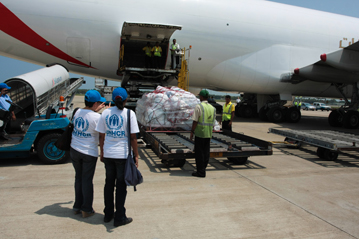Liberia faces low resources despite slowing Ivorian influx
Liberia faces low resources despite slowing Ivorian influx

BUTUO, Liberia, Nov 22 (UNHCR) - Refugees are still crossing the border from Côte d'Ivoire into north-eastern Liberia, although the number of new arrivals is decreasing by the day. Many refugees have started moving into a new UNHCR transit centre as local resources run low.
A total of 10,045 refugees have now been registered in two catchment areas, the towns of Butuo and Gporplay, around which 22 entry points have been reported. However, the overall number of new arrivals could be higher, since Ivorians are coming into Liberia through various other official and unofficial crossing points.
Women form the largest group among the refugees, who come from three main areas in western Côte d'Ivoire: Bin-Houye, Zouan-Hounien and Danané. All three districts are near the "Zone de Confiance" (Confidence Zone) patrolled by UN troops to keep the peace between Ivorian government troops and rebel forces. Some of the newcomers said that rebel forces in the north are stopping Ivorians from fleeing the country. They said they left not because of actual fighting, but for fear that the hostilities between the rebels and the government soldiers will flare up again soon.
"Many young girls fear that fighting will erupt again, and that is why we fled to Liberia," said Victoria Gbadeah, arriving in Liberia on a canoe across the Cestos River that divides the two West African countries.
Many of the refugees are of the Youcouba ethnic group, which is similar to the Ghio ethnic group living in north-eastern Liberia, and they have found not only refuge but also shelter and food with their host communities.
"They shared with us what they had but now their food has run out and this is a problem," said Elias, a refugee youth, explaining the plight of refugees in Butuo. This small border town in Liberia's Nimba county, more than 3 km from the Ivorian border, has swollen in size since the refugees started arriving in early November.
"We are only reciprocating their kindness as we were once refugees in Côte d'Ivoire," says Albert Fanga, Superintendent of Zoegeh Statutory District, explaining why the local population has been so generous to the newcomers.
Host families are accommodating up to nine or 10 refugees in each house, and food is now in very short supply. Even before the influx of refugees, there was little available for the local population, as Liberia struggles to get back on its feet after 14 years of civil strife. To remedy this situation, UN agencies and the Liberian government have agreed that food distribution will now target the population of the host community as well as the refugees. Helicopters of the United Nations Mission in Liberia (UNMIL) are flying over the area to airlift consignments of emergency relief along the border.
Refugees have started moving into the four shelters that UNHCR has built in a newly-completed temporary transit centre in Butuo. Overall, the refugees are in good health, but the situation may change fast as the number of people increases. Only one water pump is in operation in Butuo town, with three others scattered in the surrounding villages.
"Water points need to be protected, established and chlorinated to avoid the risk of waterborne disease outbreaks," warned Moses Okello, UNHCR's Representative in Liberia. "This is one of the biggest priorities for humanitarian agencies at the moment."
Although there is a clinic in Butuo, it is faced with acute shortage of essential medical needs and human capacity. UNHCR is rehabilitating an existing well, and building latrines and more rooms for the clinic. No hospital is available in the area and referral service is done by ambulances moving around the border to rescue people. A mobile clinic, provided with emergency kits, will be set up. UNHCR has given motorcycles to Liberian aid agencies which are reaching out to the furthest villages and remotest areas where the refugees arrive.
The efforts of UNHCR and other relief humanitarian workers are seriously hampered by the poor state of the road networks, the result of the ravages and neglect during the rule of former Liberian President Charles Taylor. Many bridges are completely destroyed, and there is no access other than on foot to the towns and villages. UNHCR's implementing partner, LUSH (Liberians United to Save Humanity), has started to repair some of the roads, but this will be a long process.
UNHCR is concerned about the security in Nimba county and is urging a temporary deployment of UNMIL peacekeepers and National Police units to monitor the border. This is to avoid the possibility that combatants, either Ivorians or Liberians, will start crossing into Liberia.
If the situation deteriorates, refugees will be transferred from the border area to another location further inside Liberia. An existing refugee camp in Saclepea, 80 km west of Butuo, is being considered as a possible site.
By Francesca Fontanini
UNHCR Liberia









